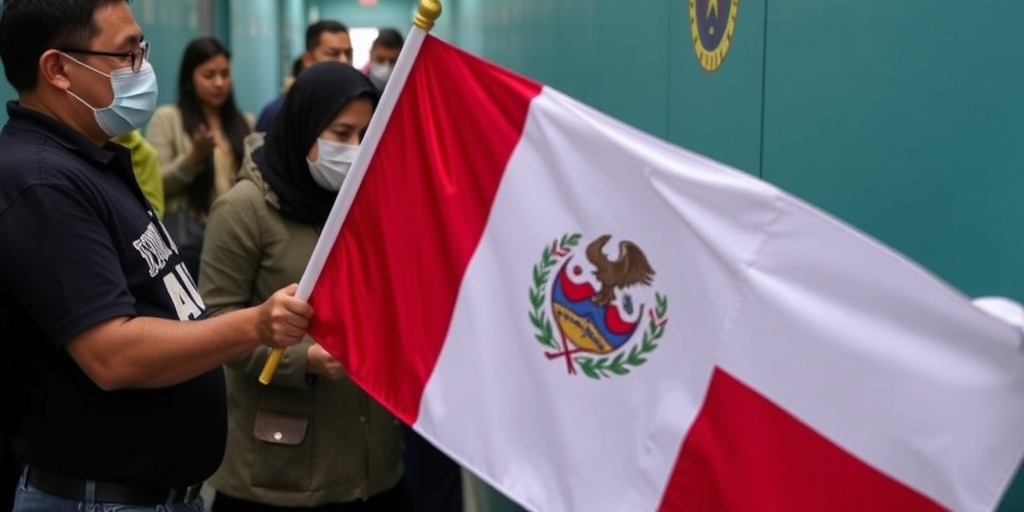Now Reading: Panama: 170 U.S. Deportees Agree to Return Home
-
01
Panama: 170 U.S. Deportees Agree to Return Home
Panama: 170 U.S. Deportees Agree to Return Home

Title: Over 170 Migrants in Panama Agree to Return to Home Countries Following U.S. Deportation Flights
Nearly a week after the United States deported around 300 migrants to Panama via military flights, Panamanian officials confirmed on Tuesday that over 170 of these individuals have consented to be repatriated to their countries of origin. The deportees largely consist of individuals who illegally crossed the U.S. border, hailing primarily from nations in Asia, the Middle East, and Africa. Many of these countries either refuse to accept deportation flights or do so infrequently.
The Trump administration has intensified its efforts to persuade various Latin American countries to accept these deported migrants amidst a broader crackdown on unauthorized immigration. So far, only Panama and Costa Rica have been reported to accept such flights.
Currently, the migrants are detained in the Decapolis Hotel Panama, a glass-paneled hotel located in downtown Panama City. Journalists from The New York Times managed to interview a few migrants there, including individuals from Iran and China. Many of them reported they had fled their home countries due to life-threatening situations.
According to Panama’s security minister, Frank Ábrego, the migrants who have not agreed to voluntary deportation—amounting to around 150 individuals—are slated to be transferred from the hotel to a camp located near the Darién Gap jungle area. At a press conference on Tuesday, Ábrego indicated that these migrants would remain in the San Vicente camp while awaiting the opportunity to seek asylum in a third country where they might feel secure.
Notably, no migrants have yet requested asylum within Panama, which has compounded the challenges surrounding their status. Despite the pressing need, Panamanian authorities have prevented deportees from leaving the hotel. Jenny Soto Fernández, a lawyer attempting to represent some of the migrants, expressed her frustration, stating she had been blocked from entering the hotel on four separate occasions.
In an interview, Fernández revealed that some migrants from Iran were interested in seeking refugee status in Panama. She mentioned, "I have all the legal documents ready," but emphasized her inability to reach those who need her assistance.
During the press conference, Minister Ábrego asserted that the government’s decision to confine the migrants to the hotel aims to ensure "security and peace for Panamanian citizens." He reiterated that the migrants are not a danger, stating that they do not possess criminal records, as described by Panama’s deputy foreign minister, Carlos Ruiz-Hernández.
From the over 170 migrants who have agreed to their deportation, around 20 are expected to be sent back to their home countries within the next week. One individual from Ireland has already completed the process and returned.
As questions arose during Tuesday’s news conference, reporters sought clarification on various accounts reported by migrants in the hotel. One such incident involved a reported suicide attempt, which several migrants communicated to The Times. In response, Minister Ábrego claimed he had no knowledge of the incident and downplayed another incident where a migrant allegedly broke a leg while attempting to escape, stating instead that the individual had merely twisted an ankle on the stairs.
Ábrego emphasized that the migrants are only under the temporary custody of Panamanian officials as part of international agreements with the United States. He preferred to frame their situation positively, asserting, "Custody sounds bad. They’re under our protection."
The ongoing situation highlights a complex intersection of international migration, humanitarian challenges, and national security concerns. As governments navigate the intricacies of deportation and asylum processes, many migrants find themselves in precarious situations, often with limited access to legal recourse and safety.
This cluster of events unfolds against a broader backdrop of shifting immigration policies and growing challenges faced by migrants worldwide. Critics argue that the current handling of these deportations does not adequately consider individual circumstances or the dangers many migrants face in their countries of origin.
As the situation develops, attention remains focus on both the legal implications for the deportees and the humanitarian responsibilities of Panama as it balances national security with international human rights obligations. The fate of the scores of migrants awaiting determination of their status remains uncertain, a poignant reminder of the ongoing global displacement crisis and its far-reaching effects on individuals and nations alike.
Stay Informed With the Latest & Most Important News
Previous Post
Next Post
-
 01New technology breakthrough has everyone talking right now
01New technology breakthrough has everyone talking right now -
 02Unbelievable life hack everyone needs to try today
02Unbelievable life hack everyone needs to try today -
 03Fascinating discovery found buried deep beneath the ocean
03Fascinating discovery found buried deep beneath the ocean -
 04Man invents genius device that solves everyday problems
04Man invents genius device that solves everyday problems -
 05Shocking discovery that changes what we know forever
05Shocking discovery that changes what we know forever -
 06Internet goes wild over celebrity’s unexpected fashion choice
06Internet goes wild over celebrity’s unexpected fashion choice -
 07Rare animal sighting stuns scientists and wildlife lovers
07Rare animal sighting stuns scientists and wildlife lovers





















